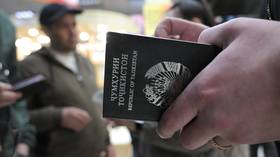Those included in the registry will not be able to get a driver’s license, use banks or register property, according to a deputy minister
Russia’s Ministry of Internal Affairs is in the process of creating a registry of migrants who have no legal basis for staying in the country, the first deputy head of the ministry, Alexander Gorovoy, has said.
In an interview with the newspaper Kommersant published on Thursday, the official explained that individuals included in the database, which is set to be launched next year, will be unable to access a range of services.
Illegal migrants will not be able to use banking services in the country or drive vehicles. They will also be prohibited from entering into or dissolving marriages, registering property, or enrolling children in kindergartens or schools.
Gorovoy added that the ministry is also cracking down on those who provide illegal services to help migrants gain legal status. He mentioned, for example, that monitoring of Russian language proficiency exams had been strengthened and efforts are being taken to remove unscrupulous intermediaries from the process.
He stated that since March of this year, the ministry had sent police officers to all exam rooms in order to monitor the tests and compare the personal data of those sitting for the exams in order to detect possible substitutions. These efforts resulted in nearly two-thirds of the facilities being shut down, while 25% of those taking the test failed, Gorovoy said.
However, despite failing the test, many migrants do not leave Russia and instead go into “the gray zone,” working without documents and not registering with the migration service.
According to Gorovoy, there are currently some 6.2 million foreign citizens living in Russia. This number, according to the official, also includes an estimated 740,000 people who are in the country illegally.
While the deputy minister stated that the number of crimes committed by foreign citizens in Russia has is down an estimated 5% compared to last year, the issue of migrant crime has remained in the forefront of Russian politics, particularly after the Crocus City Hall terrorist attack that took the lives of 145 people. A group of armed men – later identified as ethnic Tajiks – stormed the venue ahead of a rock concert this past March.
Last month, Russian President Vladimir Putin signed two new federal laws designed to grant greater powers to the internal affairs agencies for making decisions about the expulsion of illegal migrants. Foreigners could previously only be deported through a court decision. The new legislation will take effect on February 5 of next year.
You can share this story on social media:




